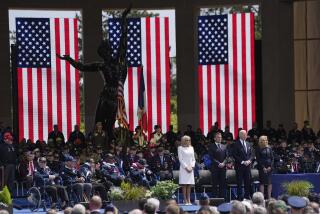PERSONAL PERSPECTIVES ON THE DAY THE WAR BEGAN: JANUARY 16, 1991 : THE BUSINESSWOMAN
- Share via
WASHINGTON — I don’t really remember World War II except that I had my first smallpox vaccination in March of 1945--I was 5 years old--and the doctor etched a “V” for victory in it.
I do remember Vietnam, how the war polarized the country, and how we didn’t win. I know the cold, starkness of the Vietnam memorial on the mall, carved with the names of everyone who was lost there.
Thoughts of another war are very sobering.
I think first of our military men and women who will be engaged--I know several. I think of them and their families, and it makes me tearful.
I think of the innocent people of Kuwait and the way they have been brutalized, and it makes me angry.
I think of our President. I have known George Bush for nearly 20 years. I trust his judgment and the quality of his character.
His decisions have been and will be well-reasoned, objective and compassionate. He will be strong and steady. That is how he looked--calm and in charge--during his address to the nation on Wednesday evening. That is how he is.
I have also known Defense Secretary Dick Cheney, Secretary of State James A. Baker III and National Security Adviser Brent Scowcroft for quite some time. They are able pros, people of quality. The same can be said for Gen. Colin L. Powell, chairman of the Joint Chiefs of Staff, and United Nations Ambassador Thomas R. Pickering.
We have as good a team as there is, and that was reassuring on Jan. 16, a day that affected so many lives. This competence and quality will continue to reassure me in the days ahead.
I think of our world. Especially, I think back to the fall of 1989, when I was serving as a public delegate to the U.N. General Assembly. The Berlin Wall had come down. New democracies were emerging in Europe and Latin America; in Africa, Namibia had become the world’s newest democracy.
I felt the euphoria in the corridors and heard it in the debate. There was optimism and hope, and I was moved by it. Virtually without exception, every one of the 160 countries wanted peace and the chance to prosper economically.
I saw the beginnings of rapprochements between old adversaries--between the haves and have-nots. I came away optimistic about the possibility for a new world order based on peace and worldwide economic growth and competition--an order through which nations could join forces to combat problems like narcotics and environmental pollution.
It wouldn’t be easy, but it would be possible.
Then came the Aug. 2 invasion that stopped the embryonic new order dead in its tracks. First, Saddam Hussein’s bald aggression and then his systematic dismantling of Kuwait and his brutality against its people.
In mid-August, on a business trip to Malaysia, I listened as several small countries’ ambassadors wondered fearfully, “What is a little country to do?”
If the world had looked the other way, clearly Hussein’s conquests would not stop. And every other petty dictator or would-be tyrant would be encouraged to follow his lead.
Would we then have a new world order governed by fear?
Would we then have an arms race the likes of which the world has never seen--with every country, large and small, thinking it needs vast arsenals, including nuclear weapons?
How could the countries of the world strive to grow the global economy and make prosperity for all a reality if they are forced to spend vast sums on armaments?
The crowning blow is that this aggression is occurring in the part of the world that holds a large measure of its oil supply, and that makes the effect of Hussein’s conquest a vital concern to us.
Uncertainty about the availability and the price of Middle East oil affects our economy directly--makes the entire economically interconnected world jittery. That uncertainty could cause a downward recessionary spiral that hurts everyone.
The situation cannot be tolerated for very long.
The United States is the only country that could have mobilized everyone against Hussein. The United Nations deserves credit, too, for its crucial role.
The attributes of world leadership are these--economic strength, military might and the ability to marshal a coalition of countries toward a common goal. The United States of America is today the only country that possesses all three.
Some may not want to admit it, some may want to forget it and some may say we cannot afford it anymore. But today this is the fact. We simply had to step up to the challenge even with the painful knowledge that if diplomacy and sanctions failed, force would be the only alternative.
The President has made the right decision. Jan. 16 was a watershed day. Either we stop Hussein’s intransigent aggression now or face bolder aggression with more difficult decisions later--and a world full of fear and economic uncertainty meanwhile.
The sacrifices are best made sooner, not later, to help ensure in the coming years that our children and grandchildren have a clear shot at realizing the American dream in an ever-expanding, peaceful global economy.
The President, his team and American men and women in uniform deserve our prayers and our unqualified support.
More to Read
Sign up for Essential California
The most important California stories and recommendations in your inbox every morning.
You may occasionally receive promotional content from the Los Angeles Times.













